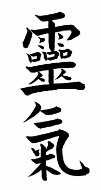
Reiki (Ray-Key American; Lay-Key Japanese) is a Japanese healing technique based on the principle that the Trained Reiki Practitioner has been taught to channel the “life force energy” into the client to activate the natural healing processes of the client’s body and therefore, restore physical and emotional well-being. This is done by the Reiki Practitioner’s hands lightly touching or hovering over the client. Reiki treats the whole person including body, emotions, mind, and spirit creating many beneficial effects that include relaxation and feelings of peace and wellbeing. According to Reiki practice and Traditional Chinese Medicine, if one’s “life force energy” is low, then we are more likely to become ill or feel stress, and if it is high, we are more able to be healthy and content.
In the context of Reiki, “rei” means universal and the word “ki” means vital (life force) energy. Therefore, the word Reiki means universal life force energy. The word “rei” in Japanese has many different meanings. In Judo it means respect, it can also mean order, command and success.
Reiki is a meditative practice and therefore promotes relaxation, a positive mental state and reduces stress and anxiety. Reiki requires no specific belief, just an open mind and the willingness to allow the healing experience to take place.
Most importantly, Reiki is holistic and non-invasive, as a result, it can be safely practiced without any harm to the client. Although Reiki is spiritual in nature, it is not a religion.
This type of healing has been practiced throughout the history of mankind. Anthropological studies show that primitive cultures used hands-on-healing, herbs and meditation to create healing. Although much of that knowledge has been lost and rediscovered through the centuries, people are now rediscovering these practices as they look for natural ways to stay healthy and decrease stress.
Reiki is classified by the National Institute of Health as a form of complementary medicine, therefore it is not covered by insurance. Reiki is a therapy based on the bio-field, a type of energy field that “regulates everything from our cellular function to our nervous system.” Quantum Physics is helping us understand how this and other healing energy practices work.
Benefits of Reiki
Stress Reduction – Relaxation – Pain Reduction – Muscle Tension Reduction – Nausea Reduction – Sleep Improvement – Acceleration of Healing
What to expect during a Reiki session

During a Reiki session, the client is asked to focus on their healing intention for the session, be it physical, emotional or spiritual in nature. The client is fully clothed and typically laying down, although it can be done with the person sitting and can be done remotely.
Some people feel the energy moving though or around the body, others feel sensations such as tingling, heat or pulsation and then others feel nothing at all. This may depend on your ability to be in touch with your body’s energy field during the treatment. Many report feeling very relaxed and often fall asleep. Regardless of your experience, the Reiki energy is still working and continues to work even after the session.
Reiki Classes
Reiki self-treatment is a way to benefit from this therapy in your own home. Ellen offers Holy Fire/Usui Reiki I, II and III training. Contact Ellen for details.
Reiki in the Medical Setting (Medical Reiki) Facts:
1. Reiki has been integrated in the hospital setting with more than 800 hospitals offering it nationwide. These include the Cleveland Clinic, Brigham & Women’s Hospital, Spaulding Rehab, Dana Farber Cancer Institute, Johns Hopkins, The Children’s Hospital, Boston, and the Mayo Clinic. It is also offered by Wake Med in Raleigh.
2. Reiki has been used in hospital Emergency Rooms, Pre-Op, Operating Room, Post Op, Oncology, Cardiology, Orthopedics, and Internal Medicine.
3. The Cleveland Clinic claims the benefits of Reiki include: – Initiating the feelings of security, peace and wellness – Promotes a peaceful, deep relaxation – Reduces stress – Stimulates the body’s immune system – Stimulates tissue and bone healing after injury or surgery – Supports the well-being of the client who is receiving medical treatments
4. The Brigham and Women’s Hospital states: “Our data, based on feedback from patients, family members and staff members who received Reiki sessions, as well as outside research, show that Reiki promotes relaxation, relieves stress and anxiety, reduces pain and fatigue, and improves overall quality of life.”
5. A research study at Hartford Hospital in Hartford, CT showed that patients that received Reiki needed less anesthesia, bled less during surgery, used less pain medication and had shorter stays in the hospital.
6. The Cleveland Clinic utilizes Reiki for cancer, infertility, Parkinson’s disease, psychological illnesses, chronic pain, digestive problems and stress related diseases.
Source: Medical Reiki Works 2020
Fees for Reiki sessions:
Reiki session Length: 60 minutes
Reiki session cost: $120
Forms of Payment: Cash, Check, Major Credit Cards
